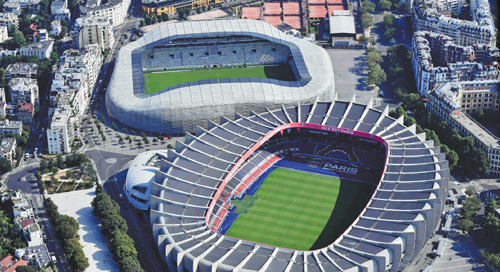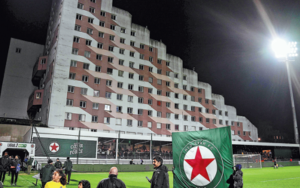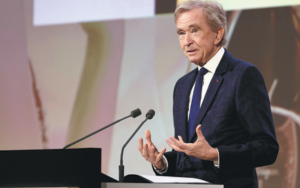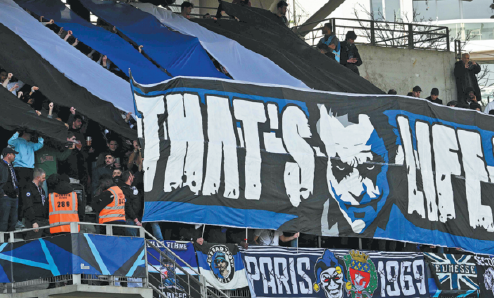Granting Paris the luxury of a soccer rivalry
Europe's richest family is looking to dethrone PSG as the French capital's sole champion

Paris has everything — stunning architecture and arguably the best food and fashion in the world. But, the French capital lacks one essential element of a modern metropolis: it has no soccer rivalry.
Despite Qatar-owned Paris Saint-Germain (PSG) spending vast sums in recent years assembling a team that has featured superstars like Lionel Messi, Neymar and Kylian Mbappe, and the club reaching this season's Champions League semifinals, the city has never truly been a soccer crucible.
Yet, the Paris region is probably the world's hottest soccer talent factory.
Twenty-nine players from the greater Paris area went to the 2022 World Cup in Qatar, including 11 members of the France squad, which reached the final, with others representing the likes of Portugal, Cameroon, Tunisia, Senegal and Morocco.
But Paris, the biggest urban area in the European Union with a population over 12 million, has had only one club in France's top division — PSG — since Racing Paris was relegated 35 years ago.
London has seven clubs in the Premier League, while Madrid, Milan, Rome, Barcelona and Athens all boast multiple top-tier teams.
That may be about to change thanks to one of the wealthiest families in the world.
Forbes Magazine notes that Bernard Arnault has spent most of the last five years jousting with Elon Musk for the title of the richest person on the planet.
The dip in the luxury goods business has seen him recently slip to merely the richest man in Europe, with an estimated fortune of around $190 billion.
The founder of LVMH, the luxury goods conglomerate that owns fashion brands like Dior, Louis Vuitton and champagne producer Moet & Chandon, has the money and the marketing muscle to move mountains.
Last November his family took a majority stake in a small club called Paris FC, with his eldest son Antoine — a soccer fan and former PSG season ticket holder — saying they wanted to turn it into a force to be reckoned with.
The family have linked up with former Liverpool manager Jurgen Klopp in a bid to take Paris FC from second-tier Ligue 2 into France's top division and eventually, it is hoped, to the Champions League.
"It is an ambitious project, but not an unrealistic one," Arnault insisted, with the club's logo, featuring the Eiffel Tower, on the wall behind him.
There is only one problem.
Average attendances at the club's Stade Charlety home had been hovering around 3,000 until Paris FC began giving away free tickets. That is a long way off the 47,000 sell-out crowds at PSG.
And Charlety, an athletics arena, "is a stadium where you cannot create an atmosphere", said Klopp, who is now Red Bull's head of global soccer.
"It has been a long time since I watched a game from that far away," he declared after watching his first match there.
But the Arnaults have plans. Next season the club will move to the Stade Jean Bouin, across the road from PSG's home, the Parc des Princes, in the upmarket 16th arrondissement.
Provocative positioning
While literally setting the club up in PSG's backyard might seem provocative, Antoine Arnault, 47, is typically smooth about the positioning.
"You will never hear me say anything negative about PSG," he said.
Instead, he said, they want to tap the Paris region's rich seam of young soccer talent.
"We want to build a team where we will have five, six, seven or even eight players who have come through the youth academy," said Antoine Arnault, whose brothers and elder sister, Delphine, are also involved.
France can currently field almost an entire team of Parisian players, including captain Mbappe and Premier League stars Ibrahima Konate — who was at Paris FC as a youth — and William Saliba.
Like Thierry Henry, Paul Pogba and others before them, they crafted their skills on the streets and pitches of the city and its grittier suburbs, called the "banlieues".
"The Paris region represents the perfect convergence between a real hothouse soccer environment and access to excellent facilities and coaching," said Tom Williams, author of Va-Va Voom: The Modern History of French Football.
Talent hotbed
It has almost 330,000 registered players, more than the number of rugby players in the entire country, with over 5,000 technical staff plus 27,000 volunteers.
Its coaching structure has developed an exceptional level of soccer at the youth level, said Ligue de Paris president Jamel Sandjak.
"It is so strong in terms of quality," he said.
The multicultural make-up of the banlieues, with large populations of first-, second- and third-generation immigrants from France's former colonies in North and West Africa, is key to why soccer thrives there, Sandjak explained.
"It is just as much our dream to become the best youth academy in France one day as it is to become French champions and play in Europe," said club president Pierre Ferracci, who is set to stay on until 2027 under the deal with the Arnaults and Red Bull.
"The dream is to perhaps one day resemble La Masia," Barcelona's fabled academy, he said, which produced Messi and Pep Guardiola among other great players.
Ferracci, 72, is confident that the Arnaults' branding and the soccer nous of Red Bull — which also took an 11 percent stake in the club — is a winning formula. "Red Bull can bring us a lot on the sporting side. The family can bring a lot in terms of managing the brand," he said.
Williams too believes they may just pull it off.
"Paris might not seem like an authentic soccer city, but the Parisian suburbs are positively teeming with kids who are soccer-mad," he said.
"With the right kind of backing, and some thoughtful marketing, particularly with regard to how they differentiate themselves from PSG, a second big Parisian club could be a huge success."
Rich men, however, have already tried and failed to break PSG's stranglehold on the French capital.
In the 1980s, businessman Jean-Luc Lagardere's conglomerate Matra took over one-time French champion Racing Club, moving it from the suburbs to the Parc des Princes, but it failed to establish itself in the top flight.
Lagardere "had huge ambitions, but he wanted too much, too soon", said Williams.
"Throwing money at the club brought glamor and short-term success, but it was unsustainable and — coupled with a failure to attract a loyal fan base — ultimately led to the club's demise."
Indeed, some doubt whether there is enough soccer passion in Paris to support a second top-tier club. Unlike elsewhere in Europe, French cities tend not to have more than one top team.
PSG was created at the start of the 1970s to fill that void, its red and blue kit created by fashion designer Daniel Hechter, an early president of the club.
And both clubs share the same origins. Paris FC was formed in 1969, quickly merging with a team from the suburb of Saint-Germain to form PSG.
But they split in 1972, with Paris FC relegated in 1974. Paris FC has spent only one season in the top flight since, and it was only in the last decade that it became a Ligue 2 regular.
While Friday's 1-1 draw with Martigues secured its promotion to Ligue 1, Paris FC remains very much in its rival's shadow, with many of its fans being disenchanted former PSG supporters.
Maxence Glevarec, 33, spokesman for their Ultras Lutetia supporters group, said they hope Paris FC will not follow PSG in "buying trophies".
"Most people don't want the club to go out and sign big stars. We want this to be about bringing through young players" who come from around Paris, he said.
Red Star romantics
But there is another side to Paris's soccer identity just across the Peripherique, the ring road that separates Paris from its suburbs.
Red Star in Saint Ouen, home of the famous flea market where the fictional gentleman super-thief Arsene Lupin is based in the eponymous Netflix series, has a loyal left-wing and hipster following in the same mold as St Pauli in Germany.
The club won the French Cup five times between 1921 and 1942, but these days is fighting to stay in Ligue 2, while dreaming of a return to the top division, which it last graced half a century ago.
Red Star represents the Seine-Saint-Denis department, dubbed "the 93" for its postcode, and known for its large immigrant population, poverty and soccer.
"I think football's future is in the suburbs, in the 93," said Paris soccer supremo Sandjak.
"That is where football's heart is. We are the number one region, but the number one department within the number one region is the 93."
Red Star's great hero is Rino Della Negra, a legendary striker and son of immigrants who became a communist French resistance fighter during World War II, before being executed by the Germans in 1944.
But, of late, their Paris FC rival has taken to taunting them for the growing number of "Bobos" — French slang for Bourgeois Bohemians — from within Paris now found on the terraces.
"We are the club of artists, laborers, young people, old people, and that is what is great about it. We are a multicultural club," Red Star general manager Pauline Gamerre told reporters.
"This is one of the biggest clubs in France. We have won things, there is an identity, a feeling of belonging."
But, for all its romantic and egalitarian rhetoric, Red Star fans do not have a say in how their club is run, and many are deeply unhappy with its owners.
In 2022, a takeover by a private equity group from the United States, 777 Partners, drew criticism from France's firebrand left-wing politician Jean-Luc Melenchon. When the new owner was unable to repay a debt to US insurance firm A-Cap, one of its investors, the company took control of Red Star.
"We can all be quite idealistic, but there is also an economic reality," admitted Gamerre when asked about fans' opposition to the owners.
Gamerre believes Red Star can go on to become "a solid Ligue 1 club", setting up a derby to savor with the city's soccer aristocracy at PSG.
But, for now, there are no saviors in sight.
Paris FC, however, has the Arnaults and Red Bull, and promotion in their sights. Only time will tell if their wealthy backers will really give them wings.
AFP




Today's Top News
- Fiscal policy for 2026 to be more proactive
- Revised law to spur high-level opening-up
- High-speed rail mirror of China's modernization
- China will deliver humanitarian aid to Cambodia
- The US 2025: a year of deep division
- China to expand fiscal spending in 2026: finance minister






























